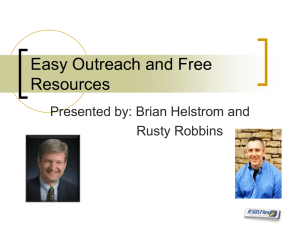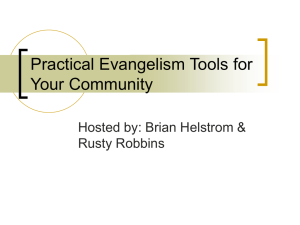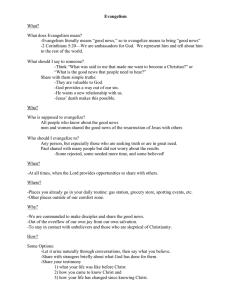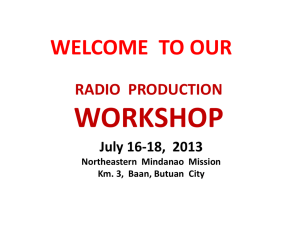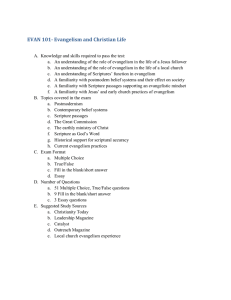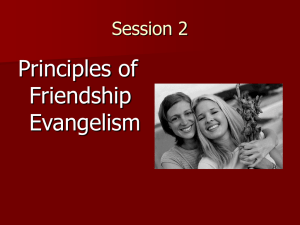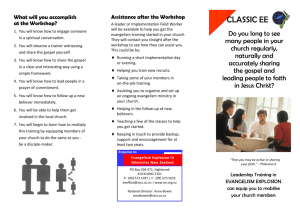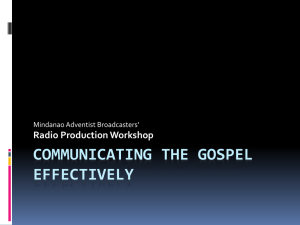MS Word File
advertisement
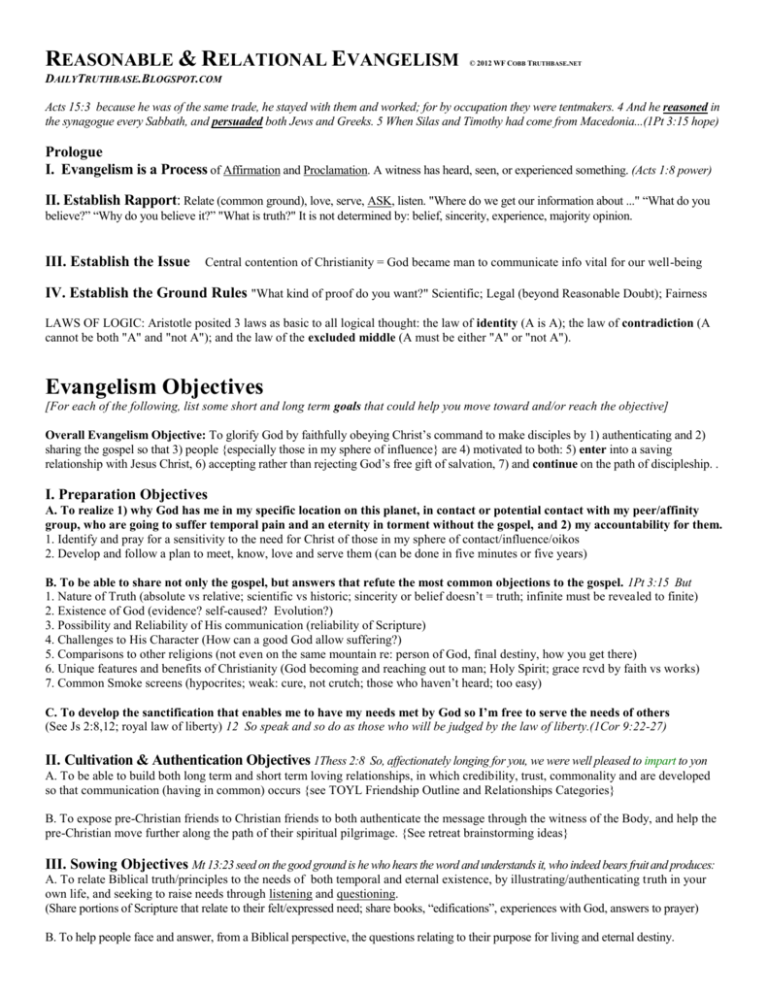
REASONABLE & RELATIONAL EVANGELISM
© 2012 WF COBB TRUTHBASE.NET
DAILYTRUTHBASE.BLOGSPOT.COM
Acts 15:3 because he was of the same trade, he stayed with them and worked; for by occupation they were tentmakers. 4 And he reasoned in
the synagogue every Sabbath, and persuaded both Jews and Greeks. 5 When Silas and Timothy had come from Macedonia...(1Pt 3:15 hope)
Prologue
I. Evangelism is a Process of Affirmation and Proclamation. A witness has heard, seen, or experienced something. (Acts 1:8 power)
II. Establish Rapport: Relate (common ground), love, serve, ASK, listen. "Where do we get our information about ..." “What do you
believe?” “Why do you believe it?” "What is truth?" It is not determined by: belief, sincerity, experience, majority opinion.
III. Establish the Issue
Central contention of Christianity = God became man to communicate info vital for our well-being
IV. Establish the Ground Rules "What kind of proof do you want?" Scientific; Legal (beyond Reasonable Doubt); Fairness
LAWS OF LOGIC: Aristotle posited 3 laws as basic to all logical thought: the law of identity (A is A); the law of contradiction (A
cannot be both "A" and "not A"); and the law of the excluded middle (A must be either "A" or "not A").
Evangelism Objectives
[For each of the following, list some short and long term goals that could help you move toward and/or reach the objective]
Overall Evangelism Objective: To glorify God by faithfully obeying Christ’s command to make disciples by 1) authenticating and 2)
sharing the gospel so that 3) people {especially those in my sphere of influence} are 4) motivated to both: 5) enter into a saving
relationship with Jesus Christ, 6) accepting rather than rejecting God’s free gift of salvation, 7) and continue on the path of discipleship. .
I. Preparation Objectives
A. To realize 1) why God has me in my specific location on this planet, in contact or potential contact with my peer/affinity
group, who are going to suffer temporal pain and an eternity in torment without the gospel, and 2) my accountability for them.
1. Identify and pray for a sensitivity to the need for Christ of those in my sphere of contact/influence/oikos
2. Develop and follow a plan to meet, know, love and serve them (can be done in five minutes or five years)
B. To be able to share not only the gospel, but answers that refute the most common objections to the gospel. 1Pt 3:15 But
1. Nature of Truth (absolute vs relative; scientific vs historic; sincerity or belief doesn’t = truth; infinite must be revealed to finite)
2. Existence of God (evidence? self-caused? Evolution?)
3. Possibility and Reliability of His communication (reliability of Scripture)
4. Challenges to His Character (How can a good God allow suffering?)
5. Comparisons to other religions (not even on the same mountain re: person of God, final destiny, how you get there)
6. Unique features and benefits of Christianity (God becoming and reaching out to man; Holy Spirit; grace rcvd by faith vs works)
7. Common Smoke screens (hypocrites; weak: cure, not crutch; those who haven’t heard; too easy)
C. To develop the sanctification that enables me to have my needs met by God so I’m free to serve the needs of others
(See Js 2:8,12; royal law of liberty) 12 So speak and so do as those who will be judged by the law of liberty.(1Cor 9:22-27)
II. Cultivation & Authentication Objectives 1Thess 2:8 So, affectionately longing for you, we were well pleased to impart to yon
A. To be able to build both long term and short term loving relationships, in which credibility, trust, commonality and are developed
so that communication (having in common) occurs {see TOYL Friendship Outline and Relationships Categories}
B. To expose pre-Christian friends to Christian friends to both authenticate the message through the witness of the Body, and help the
pre-Christian move further along the path of their spiritual pilgrimage. {See retreat brainstorming ideas}
III. Sowing Objectives Mt 13:23 seed on the good ground is he who hears the word and understands it, who indeed bears fruit and produces:
A. To relate Biblical truth/principles to the needs of both temporal and eternal existence, by illustrating/authenticating truth in your
own life, and seeking to raise needs through listening and questioning.
(Share portions of Scripture that relate to their felt/expressed need; share books, “edifications”, experiences with God, answers to prayer)
B. To help people face and answer, from a Biblical perspective, the questions relating to their purpose for living and eternal destiny.
(Lead an Evangelistic or topical Bible Study)
IV. Reaping Objectives Jn 4:36 he who reaps receives wages s, and gathers fruit for eternal life…may rejoice together.
A. To share an illustration of the Gospel bringing people to a consequence-informed decision of accepting or rejecting God’s offer.
(Memorize and practice the Bridge illustration.)
B. To be able to assure a convert of their secure salvation, and both motivate and lead them through the initial steps of follow-up (Study the
Discipleship Verses with them).
Lifestyle – Relational Evangelism II Needs
I. We need to know others' needs and God’s plan to meet those needs (objective & subjective revelation)
Focusing on ourselves and what other’s think about us, seeking their approval rather than God’s keeps us dumb/mute.
Satan encourages us to eschew Jesus’ example, and live self-centered rather than God-centered and other-centered lives.
We need develop our own spiritual walks so we have a sensitivity to the Spirit of God and His timing for meeting other’s needs.
We need to observe, listen to and question others so we are aware of their needs and understanding. Then we related God to their need.
II. Points of Entry – restless dissatisfaction
A. Security – safety in difficulties, trials, catastrophes; “Is there a safe place in life?”
B. Relationship, understanding, acceptance, belonging, love; “Are there relationships where I won’t be used or tempted to use others?”
C. Freedom from: past, anxiety, fear, bitterness, guilt, addiction, failure; “How can I change, or make things different?”
D. Confidence – hope - certainty re future; “What does the future hold?”
E. Satisfaction and contentment ; Missing the abundant life - blessing; something is missing, wrong; “Is this all there is?”
F. Significance, Meaning and Purpose for the present; Hope for future; “Why am I here?”
G. God allows us to reap consequences to experience separation, eventually longing for Him (intimacy, purpose, power, meaning, etc)
III. Barriers
A. Ethos – authentic, credible, our relationship with Christ is working for us
If Christianity is just viewed as fire insurance, it’s hard to see it at work except in peace re: death.
If it is experienced as power for living, then it’s manifestations are multitudinous; just brush up against us and Christ rubs off
If held in hypocritical hands, it backfires, becoming a bad advertisment.
B. Pathos – We feel passionately about what has great value for us; is the absolute truth/way without rivals, and has great significance
We feel strongly about other’s needs, as we develop a Christlike love and compassion for them, identifying with their humanity and
viewing the certainty of their destruction and availability of God’s provision for their needs.
C. Logos
We need to be able to bring people to: 1) an awareness of their need, 2) a logical understanding of God’s offer to meet their need, and
3) the necessity of accepting or rejecting that offer, removing the barriers to their belief.
Questions for Reflection/Discussion/Response:
1. What’s the difference between evangelism as an activity and as a lifestyle? Between evangelism and witnessing?
2. What’s your purpose and goal in evangelism? What does a person have to do/ believe to become a Christian?
3. How should you respond if someone says they’re not interested in your religion; they’re glad it works for you, but it’s not for them?
4. Why is having a solid, authentic walk with God important in sharing your faith with others?
5. Since the goal is reproductive disciples, not relationships, at what point does one fish or cut bait? (Back burner) Mt 10:13 worthy
6. Which non-believers can you start praying for, cultivating (know and dig), sowing, reaping, etc? How will you do that?
